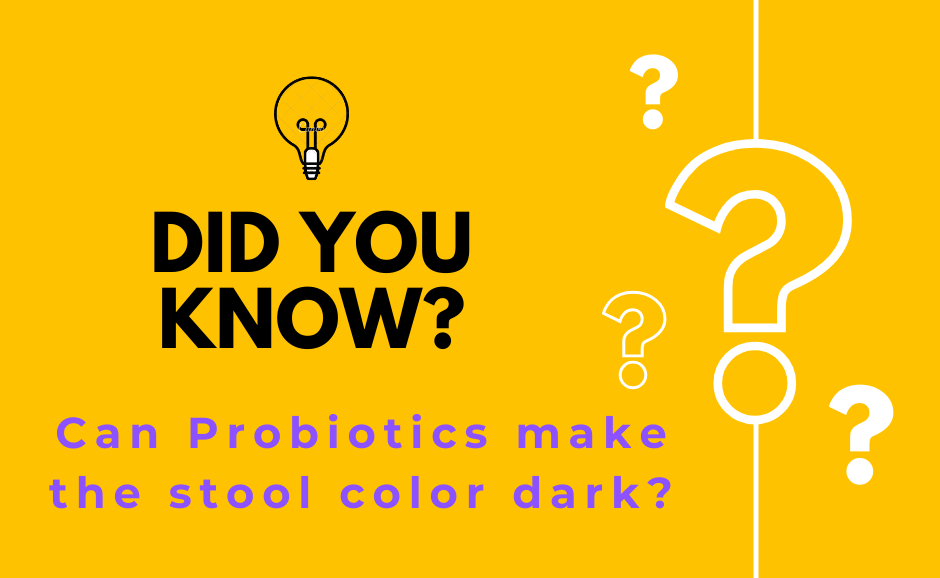1: Unraveling the Probiotic Effect on Stool Color
Introduction
Embarking on a journey towards the journey of question”Can Probiotics Make Stool Dark?can gut health often involves incorporating probiotics into our daily routine?. Whether through supplements, yogurt, or fermented foods, these beneficial bacteria are renowned for their positive impact on digestion. However, the connection between probiotics and stool color is a topic that deserves exploration.
Probiotics: The Gut’s Friendly Allies
Before we unravel the mystery of dark stools, let’s revisit the fundamental role of probiotics. These microscopic warriors play a crucial role in maintaining the delicate balance of our gut microbiome. By promoting the growth of beneficial bacteria, probiotics contribute to improved digestion, enhanced nutrient absorption, and overall digestive well-being.
The Intricacies of Stool Color
Our digestive system is a complex orchestra, and stool color is a symphony of various factors. From the foods we consume to the medications we take, everything leaves its mark on the final act of digestion. Dark stools, in particular, can be attributed to several elements, including the presence of blood, certain foods, or medications.
2: The Probiotic Influence: Setting the Record Straight
Understanding Strain-Specific Effects
The impact of probiotics on stool color is not a one-size-fits-all scenario. Different strains of probiotics may interact with the digestive process in unique ways. While some strains contribute to normal stool color, others might have negligible effects.
Adjustment Period of the Gut Microbiota
When introducing probiotics into our routine, the gut undergoes an adjustment period. This transition might lead to temporary changes in stool color. As the microbiota adapts to the influx of beneficial bacteria, these alterations are generally benign and often part of the natural process.
Potential Factors at Play
The dynamic nature of our digestive system means that several factors could contribute to changes in stool color during probiotic consumption. Increased bile production, specific strains influencing pigmentation, and the overall restructuring of the gut microbiome are all potential players in this colorful symphony.
3: Practical Tips for Probiotic Enthusiasts
Selecting Probiotics Wisely
For those concerned about stool color changes, selecting probiotics with specific strains known for their digestive benefits can be a strategic approach. Lactobacillus acidophilus and Bifidobacterium bifidum are examples of strains that support digestive health without significantly impacting stool color.
Pairing Probiotics with a Balanced Diet
Maintaining a well-rounded diet is essential for overall gut health. Combining probiotics with a diverse array of fruits, vegetables, and whole grains ensures a holistic approach to digestive wellness.
4: Debunking Myths and Clarifying Concerns
Blood vs. Probiotics: Dispelling Misconceptions
Dark stool is often associated with the presence of blood in the digestive tract. It’s crucial to differentiate between the benign effects of probiotics on stool color and potential signs of gastrointestinal bleeding.
The Spectrum of Individual Responses
Just as our bodies respond uniquely to various foods, probiotic reactions also vary from person to person. What causes changes in stool color for one individual might not have the same effect on another.
5: Long-Term Effects and Seeking Professional Guidance
Establishing a New Normal
As the gut acclimatizes to the introduction of probiotics, any initial changes in stool color are likely to normalize over time. Consistency in probiotic consumption and a balanced diet contribute to a stable gut environment.
Consulting Healthcare Professionals
For those with persistent concerns or if dark stool becomes a recurrent issue, seeking advice from healthcare professionals is crucial. They can assess individual health conditions and provide personalized recommendations.
6: Conclusion: A Symphony of Wellness
In conclusion, the relationship between probiotics and dark stool is more of a harmonious symphony than a discordant note. Understanding the intricacies of strain-specific effects, the adjustment period of the gut microbiota, and potential contributing factors offers a clearer perspective.
As we navigate the colorful world of digestive health, let’s appreciate probiotics as allies in this symphony of wellness. Embrace the nuances, stay informed, and remember that the journey to optimal gut health is as unique as you are.
Read also about kids probiotics
Read more about gut probiotics
5: Long-Term Effects and Seeking Professional Guidance
Establishing a New Normal
As the gut acclimatizes to the introduction of probiotics, any initial changes in stool color are likely to normalize over time. Consistency in probiotic consumption and a balanced diet contribute to a stable gut environment.
Consulting Healthcare Professionals
For those with persistent concerns or if dark stool becomes a recurrent issue, seeking advice from healthcare professionals is crucial. They can assess individual health conditions and provide personalized recommendations.
6: Conclusion: A Symphony of Wellness
In conclusion, the relationship between probiotics and dark stool is more of a harmonious symphony than a discordant note. Understanding the intricacies of strain-specific effects, the adjustment period of the gut microbiota, and potential contributing factors offers a clearer perspective.
As we navigate the colorful world of digestive health, let’s appreciate probiotics as allies in this symphony of wellness. Embrace the nuances, stay informed, and remember that the journey to optimal gut health is as unique as you are.
FAQs: Navigating the Probiotic Landscape
1. Can probiotics make my stool consistently dark?
- Answer: While temporary changes may occur during the adjustment period, consistent dark stool may indicate an underlying issue. Consult a healthcare professional for personalized advice.
2. Is it normal for stool color to fluctuate when taking probiotics?
- Answer: Yes, initial fluctuations are common as the gut adjusts. However, if these changes persist or worsen, seeking professional guidance is recommended.
3. Do specific probiotic strains contribute more to dark stool?
- Answer: Some strains may have subtle effects, but the impact varies. Lactobacillus acidophilus and Bifidobacterium bifidum are generally well-tolerated without significant stool color changes.
4. How long does it take for stool color to normalize after starting probiotics?
- Answer: Normalization varies among individuals. Consistent probiotic use, a balanced diet, and staying hydrated contribute to a more stable gut environment.
5. Should I stop taking probiotics if I notice dark stool?
- Answer: If changes persist, consult with a healthcare professional before making any decisions. Abruptly stopping probiotics may not be the solution, and professional guidance ensures a tailored approach.



!["Experience the Gut Symphony: [Nutrition Essentials Probiotic] – Your Key to Holistic Well-being"](https://purewellbeinghealth.com/wp-content/uploads/2024/02/nutrition-essential-probiotic-540x400.jpg)
![A vibrant display of [Kidbiotics] gummies, showcasing their delightful shapes and colors. These delicious gummies are not just a treat for the taste buds; they're a powerful dietary supplement designed to support your child's gut health. Packed with beneficial probiotics and free from GMOs, gluten, and animal-derived ingredients, [Kidbiotics] are a wholesome addition to your child's daily routine. Embrace the joy of promoting your child's well-being with these flavorful and health-conscious gummies."](https://purewellbeinghealth.com/wp-content/uploads/2024/01/t6ng_5gv1_230206-scaled.jpg)


